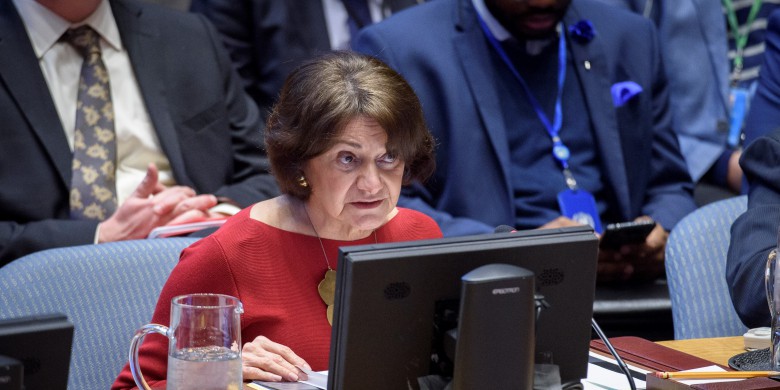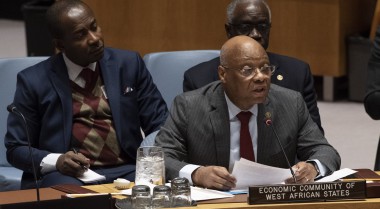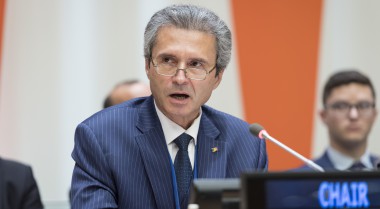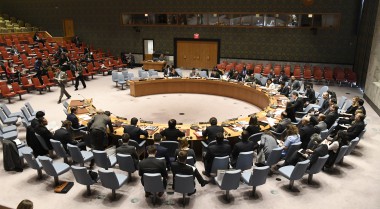
UN Update: the Nexus between Climate Change and International Peace & Security
On January 25, the UN Security Council held an open debate recognizing the impacts of climate-related disasters on international peace and security. The President of the Council, the Dominican Republic, set the tone for the meeting as one of imperative importance: “Climate change is the defining issue of our time” with a “direct” and “existential threat” on the global community. Under-Secretary–General (USG) of the Department of Political and Peacebuilding Affairs Rosemary A. DiCarlo reiterated the serious need to prioritize addressing climate change as both a cause and effect of peace and security concerns. She stated that climate change affects the most vulnerable communities and “compounds existing grievances and threats.”

The concept note for the open date clearly lays out how climate change directly threatens human security as well as “multiplying existing vulnerabilities and risk[s] making conflict more likely, more intense and longer-lasting.” It contributes to food insecurity, water scarcity, land degradation, desertification, which then fuel conflict between farmers, monopolies over resource access, unplanned and unsustainable urbanization, and displacement.” As the likelihood of disasters become more frequent, those affected communities will be forced to rebound in a shorter amount of time with a smaller amount of resources. This is the case across the globe. In Somalia for instance, frequent and longer droughts have directly led to the displacement of nearly 2.6 million people. In Sudan, diminishing resources have fueled competition and tensions between farmers. In the Lake Chad region, USG DiCarlo highlighted that unpredictable rain patterns have “impeded traditional livelihood options” and “reduced the opportunity cost of joining armed groups.”
Climate change directly threatens human security as well as multiplying existing vulnerabilities and risks making conflict more likely, more intense and longer-lasting.
Climate change also threatens the very existence of communities. Coastal and island communities in the Caribbean, Latin America, and the Pacific are already suffering the consequences of rising sea levels. Erosion of land and salination of fresh water sources are some of the serious issues facing these communities. Without proper and swift action, they will become uninhabitable and eventually completely submerged. Rising sea levels also affect larger populations in “megacities,” such as New York City and Tokyo that are located along the coastline.
The UN open debate builds upon decades of conversations, conventions, and calls to action to take on the pressing concerns of climate change. Furthermore, the open debate reiterated that the climate change is a complex and intersectional challenge which requires full cooperation between all stakeholders. Other agendas, such as conflict prevention, women, peace, and security, counterterrorism, and the sustainable development goals, can only be fully realized when action to combat climate change is prioritized as well.
For example, the outcomes of the 62nd Commission on the Status of Women recognized that the intrinsic connection between the women, peace, and security agenda and addressing climate change when it noted that “women and girls are disproportionately affected by climate change,” especially those in rural communities. Moreover, it exacerbates existing disadvantages, vulnerabilities, and inequalities facing women and girls in their communities. Therefore, it will be necessary to tackle the harmful effects of climate change through a gender sensitive approach. The agreed conclusions for CSW 62 called for “essential infrastructure, services, appropriate financing, technology, and social protection, humanitarian relief, forecast and early warning systems, and decent work” in order to empower women and girls to respond to and recover from climate change.
The UN Sustaining Peace resolutions and reports call for a more coherent UN that addresses threats to international peace and security by working across its humanitarian, development and peace, and security pillars. Addressing climate change is one such topic that will require this coherent action as it impacts on humanitarian action, sustainable development and the prospect for lasting peace.
The January open debate echoed a critical understanding of climate change from the 1992 UN Framework Convention on Climate Change. Climate change and its consequences are a “common concern of humankind.” The consequences are universal and require immediate action. According to a UN scientific panel special report of October 2018, the international community needs to take serious action in the next 11 years. By 2030, some consequences of climate change might be devastatingly irreversible.
There is no doubt that climate change is a monumental challenge that requires intentional cooperation and effective participation from all international actors. UN Secretary General António Gueterres has called for "urgent and far more ambitious action to cut emissions by half by 2030 and reach net zero emissions by 2050." The Sustainable Development Goals are rooted in creating resilient societies that coexist with nature. By addressing climate change directly, the international community can tackle some the root causes of conflict and create more inclusive and sustainable societies for generations to come.


